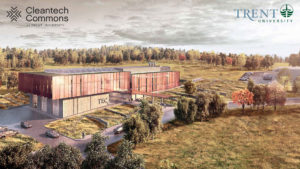Cleantech Commons “leading the charge for cleantech commercialization” – “essential to bolster Canada’s reputation for innovation”
In an article titled “Canada needs to boost its clean technology sector,” The Globe & Mail identifies Trent University as “[an] academic institution leading the charge for cleantech commercialization.”
 “Recognizing the need to nurture commercialization in the clean technology sector, [Trent’s] Cleantech Commons is a research park designed to boost collaboration between private industry and the academic community,” writes The Globe.
“Recognizing the need to nurture commercialization in the clean technology sector, [Trent’s] Cleantech Commons is a research park designed to boost collaboration between private industry and the academic community,” writes The Globe.
The publication quotes Cleantech Commons executive director, Martin Yuill, saying that the park will create “a cluster of scalable growth companies in the areas of clean, green and low-carbon technology development.”
“Resources like Cleantech Commons are essential in moving Canada up the commercialization ranks, and to bolster its reputation for innovation,” The Globe writes.
Trent is a well-recognized centre of education and research excellence, Yuill tells us.
He says that the Cleantech Commons research park will create the opportunity to build on that strength by forging cross-disciplinary linkages between education, research and business to drive innovation in the clean technology sector.
Cleantech Commons will provide a location for businesses to work alongside Trent’s world-leading researchers and students to explore practical solutions to current and future energy, environment, and climate challenges.
The research park will also provide spaces where students, academics and businesses get to collaborate to explore new ideas, develop prototype designs, and create new clean, green, low-carbon, sustainable and circular economy products, services, and solutions.

“By bringing innovators, researchers, and industry together in a vibrant ‘town square’ setting, designed specifically for structured creativity, collisions, collaboration, and community building, Cleantech Commons will offer innovators and entrepreneurs a perfect space conducive to conversation, interaction, and engagement – one where innovation can flourish, enduring partnerships can be created, and creative collaboration can be kick-started,” Yuill says, adding: “Cleantech Commons is being designed equally for intellect and imagination.”
He believes that this will help the region’s reputation as a centre of scientific research, discovery and commercialization, and boost both its economic footprint and social impact.
In an interview with Peterborough and the Kawarthas Economic Development, Yuill explained how the research park is fashioning a unique clean technology hub that is responsive to the needs of the cleantech sector and is creating what he calls a “connected community of innovation“. See “2021 is set to be an exciting year for Cleantech Commons”.

“Cleantech Commons is not only being thoughtfully designed to meet the needs of Canada’s emerging cleantech innovators and entrepreneurs but is also fully integrated with the Trent University campus to encourage social interaction and collaboration, is a leader in sustainable design, and is well connected to the city and region in which it is located,” Yuill says.
He believes this will help to achieve the research park’s long-term goal of generating, attracting, and retaining leading science and clean technology companies and talent in the greater Peterborough region.
A partnership between Trent University and the City of Peterborough, the location for Cleantech Commons was selected to capitalize on the wealth of cleantech expertise at Trent and other academic institutions in the area, such as Sir Sandford Fleming College.
“The idea behind the research park,” The Globe writes, “is to attract a range of companies: from early-stage businesses looking for investment, mentorship, and skilled labour; to large enterprises that want to collaborate and engage with the ventures, technology and talent being developed; to startup and spinout companies from academic research.”
The sector focus of Cleantech Commons is designed specifically around the expertise of Trent University’s core scientific research areas. These include water technology, environmental services, advanced materials sciences, agri-food and biotechnology, and information and communications technology.
Learn more about Cleantech Commons’ sector focus areas, tenant criteria, and tenant evaluation and assessment process here!
“[Cleantech Commons] is in talks with developers to create facilities for tenants,” The Globe reports in its article, pointing out that there are many companies currently interested in taking up space in the research park, and that the organization has raised $4.8-million in grant funding from the federal government for a cleantech accelerator to be located at the research park.

This clean technology accelerator will be known as the Trent Enterprise Centre. It will provide shared labs, space for technology assessment, demonstration and piloting, office space for student entrepreneurs, and scale-up facilities for startups and spinout companies from academic research.
The idea behind the Trent Enterprise Centre is to “get new technologies to market quicker,” Yuill is quoted telling The Globe.
Speaking at the announcement of a partnership with Bioenterprise, Canada’s Food & Agri-Tech Engine, which will bring agri-tech and food accelerator services to Cleantech Commons tenants, Yuill emphasized that in addition to a suite of business acceleration services, Cleantech Commons will also provide incubation programming, experiential learning opportunities, and co-working spaces for aspiring student entrepreneurs, as well as commercialization training for researchers.
These value-added services will all be offered through the Trent Enterprise Centre initiative.
“This unique combination of value-added business support, advisory and mentorship services, and entrepreneurship programming will give Trent students the opportunity to end their time at university with more than just a degree,” says Yuill.
“They will also be able to develop the skills required to be a cleantech entrepreneur, acquire marketable skills that will give them an edge in a competitive job market, and potentially even create a startup venture of their own.”

